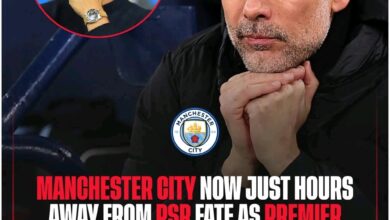Best player on the team’ – National media simply blown away by 9/10 Liverpool star

It was a night filled with rhythm, passion, and the golden glow of South American football — and at the heart of it all was a man in light blue and white who looked like he had rediscovered himself. Alexis Mac Allister, Liverpool’s quiet genius from Argentina, was once again in full bloom. In a friendly that might have seemed ordinary to some, the Liverpool midfielder turned it into a personal statement — a declaration that form is temporary, but class is forever. Argentina thrashed Puerto Rico 6-0 in Miami, and Mac Allister was the conductor of the orchestra. He didn’t just play — he dominated. Two goals, endless energy, and a performance that had fans, teammates, and even critics in awe.
The first goal came early — just 14 minutes in. A slick move down the left saw Nico González whip in a dangerous ball, and there was Mac Allister, perfectly timed, darting into the box like a striker born for the moment. The contact wasn’t loud or forceful; it was intelligent, subtle, guided by instinct. The ball deflected off his head, and the net rippled softly. The stadium, filled with thousands of Argentine fans waving flags and chanting songs of champions, erupted. In that instant, you could feel that familiar pulse of belief. Mac Allister raised his hands to the sky — not in arrogance, but in calm satisfaction. The Liverpool man who had struggled for rhythm this season was alive again.
And before halftime, he struck again. This time, it wasn’t about timing — it was pure fire. He received the ball near the edge of the box, cut inside with that slow, deceptive glide of his, and lashed it into the bottom corner. The keeper didn’t even move. 3-0, and Argentina were dancing, smiling, and celebrating under the Miami lights. But for Liverpool fans watching at home, this was more than just another friendly. It was hope. It was a reminder that the same man who helped guide their midfield to Premier League glory last season still carried that spark.
For Argentina, the night was a festival. Lionel Scaloni’s men looked every bit like world champions — fluid, confident, ruthless. But it was Mac Allister who stood out. The Argentine media wasted no time showering him with praise. The famous sports outlet *Clarin* handed him a 9/10 rating, calling him “dangerous in the box, clear with his touch, and intelligent in every movement.” *Ole* went even further, hailing him as “the best player in the midfield and on the team.” They described his game with the precision of poetry — “an opportunistic header to deflect Nico González’s shot for the 1-0 lead, and then in goal-scoring mode to convert the third with a powerful finish.”
Bola VIP echoed that same admiration, saying Mac Allister had become “the most decisive player in the match” and “cemented his position as the most successful midfielder of the Scaloni era.” Even *TyC Sports* joked that he could have had a hat-trick, noting that he played “almost as a false nine, scoring two and threatening to score more.” *River el mas Grande* summed it up simply: “He made quick recoveries, accurate passes, and scored two very nice goals.”
It was one of those nights where the football world seemed to pause and remember what Alexis Mac Allister can do when he’s free — when the weight of expectation doesn’t crush him. For Liverpool supporters, those words from Argentina were like music. Because back home in England, things had been hard. Arne Slot’s Liverpool were in a rough patch — three consecutive defeats in all competitions had turned the mood around Anfield from electric to anxious. The new season had promised so much after last year’s title triumph, but early injuries and fatigue had unsettled the squad. And in the middle of it all, Mac Allister, one of last season’s heroes, had looked strangely out of rhythm.
The Argentine midfielder, known for his calm control and perfect passing, seemed tired, hesitant, almost too cautious. Slot had asked him to play in deeper roles, sometimes as a defensive pivot — far from the creative spaces he thrived in under Klopp. Fans began to whisper that he looked uncomfortable. Pundits said he wasn’t himself. But football, as it always does, gave him another stage — and this time, it was far from the grey skies of Merseyside. In the warmth of Miami, wearing the colors of his country, he was himself again.
After the final whistle, Mac Allister smiled as he walked off the pitch. The cameras caught him embracing Lionel Messi, who whispered something in his ear. No one knows what was said, but the image told a story — the passing of belief, the recognition of talent. Argentina had not just won another friendly; they had reminded one of their brightest that his light still shone.
For Liverpool fans, the news spread quickly. “Mac Allister back to his best,” one fan tweeted. “Just in time for Manchester United.” The timing couldn’t be better. The Reds’ next game was against their fiercest rivals, a clash that needed energy, creativity, and leadership from midfield — exactly what Mac Allister had shown in Miami.
But there was a small problem. The match had taken place in the USA, and Liverpool’s coaching staff knew the challenge that came next: the long flight back, jet lag, and the need to adapt quickly to England’s cold October air. Still, with Ryan Gravenberch nursing a hamstring problem and Wataru Endo unavailable due to injury, the options were thin. Arne Slot had a decision to make — should he throw Mac Allister straight into the fire, or rest him for one more game?
Inside the AXA Training Centre, preparations for the United match were intense. Slot gathered his players, analyzing clips from their previous defeats, pointing out mistakes in transitions, and urging them to regain their hunger. “We’re Liverpool,” he said. “We fight until we win again.” And when Mac Allister walked into the room, everyone turned. His smile, his confidence — it was contagious. Teammates like Dominik Szoboszlai and Curtis Jones were quick to tease him about his brace for Argentina, but deep down, everyone knew he had returned with something they’d all missed — belief.
The following training session was sharp. Mac Allister’s passes were crisp again, his touches smooth, his positioning perfect. Even Arne Slot couldn’t hide his smile. He pulled the Argentine aside and said, “You looked like yourself again out there.” Mac Allister just nodded quietly. He was never one to speak too much; he preferred to let the ball do the talking.
The local media in Liverpool also picked up on the story. Will Rooney, writing for *LiverpoolWorld*, described how the midfielder’s resurgence could not have come at a better time. He wrote, “Seeing Mac Allister fire a double for Argentina will delight Liverpool fans. The former Brighton man was excellent as the Reds claimed the Premier League title last season, and his performances were recognised with a spot in the PFA Team of the Year. But so far this campaign, Mac Allister has struggled to build rhythm and his displays have been well short of his usual standards.”
Every word rang true. Liverpool’s midfield last season had been a masterpiece of control, rhythm, and coordination — and Mac Allister was its heartbeat. His ability to switch play, link defense with attack, and create angles made Liverpool unstoppable. But football changes fast. Injuries, new tactics, and fatigue can strip away rhythm like rain washing off chalk from a board. What Argentina gave him that night in Miami was a fresh page. A reminder.
Back home, the streets of Liverpool buzzed with the usual excitement ahead of the United game. Fans in pubs debated lineups, while others replayed clips of Mac Allister’s goals on their phones. “If he starts, United won’t know what hit them,” one fan said at The Sandon, a pub not far from Anfield. Another replied, “He just needed confidence. Argentina gave him that.”
At the same time, pundits on talkSPORT and Sky Sports began predicting the midfield battle. “If Mac Allister brings his Argentina form to Anfield,” one analyst said, “Liverpool will dominate.” But they also warned of fatigue. Long flights, different time zones — the little details that affect big matches.
For Mac Allister himself, the focus was simple: train, recover, and be ready. His father, Carlos Mac Allister, a former Argentine international, called him that evening. “You looked like you were enjoying it again,” he said. Alexis smiled. “Yeah, I did. It felt like old times.” His father laughed softly. “Then keep it that way. Football always rewards those who play with joy.”
By Friday, Arne Slot had made up his mind. “He’s starting,” he told his assistants. “We need his calm. We need his balance.” That decision spread through the training ground like a small burst of electricity. The players knew it. The fans suspected it. Mac Allister was back — not just physically, but mentally.
Saturday came, and with it, the final training session before the Manchester United clash. The tempo was high, the mood fierce. Szoboszlai, Gravenberch (still doing light work), and Harvey Elliott all pushed hard. But it was Mac Allister who stood out again. In a practice game, he floated between lines, sprayed passes, and ended one move with a curling shot into the top corner. The squad clapped. Slot nodded. Everything was coming together again.
When matchday finally arrived, the atmosphere at Anfield was electric. The flags waved, the songs echoed, and the cold wind carried the familiar sound of belief. “You’ll Never Walk Alone” roared through the night sky as players walked out, each step heavy with purpose. Mac Allister, standing in the tunnel beside Virgil van Dijk, took a deep breath. This was home.
For fans, it didn’t matter what happened in Miami — what mattered now was what would happen on this pitch, under these lights. But for Mac Allister, the two were connected. That brace in Argentina wasn’t just two goals; it was the fire he needed to reignite. He walked out smiling, the same calm expression he wore before that first goal in Miami.
And as the referee’s whistle blew and the game began, it was clear — Alexis Mac Allister was back to being Liverpool’s heartbeat. Every touch, every pass, every run carried confidence. The crowd could see it. The teammates could feel it. It was as if the spirit of Argentina had followed him across the ocean, whispering in his ear that night: play with freedom.
That’s the beauty of football. One night in Miami can change everything in Liverpool. And for Mac Allister, that’s exactly what it did — it brought back his rhythm, his smile, and the magic that made him the “best player on the team.”
Because sometimes, it doesn’t take a final or a trophy to remind the world who you are. Sometimes, all it takes is one perfect night under foreign lights — and a man in blue and white rediscovering his red heart.















